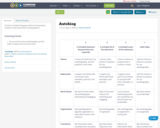
A rubric in student language written for elementary students to self-assess their autobiographies.
- Subject:
- English Language Arts
- Material Type:
- Assessment
- Date Added:
- 10/01/2018

A rubric in student language written for elementary students to self-assess their autobiographies.
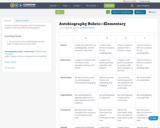
A rubric in student language written for elementary students to self-assess their autobiographies.
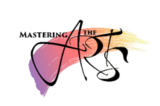
This resource was created by Kate Chrisman, in collaboration with Lynn Bowder, as part of ESU2's Mastering the Arts project. This project is a four year initiative focused on integrating arts into the core curriculum through teacher education and experiential learning.
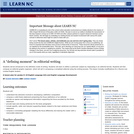
Students will be introduced to the definition mode of writing. Students will learn to define a particular subject by responding in an editorial format. Students will first compose an editorial graphic organizer, which will aid in composing a completed editorial using the writing process.
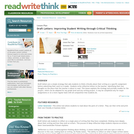
Draft letters ask students to think critically about their writing on a specific assignment before submitting their work to a reader. This lesson explains and provides models for the strategy.
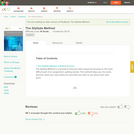
The Glyfada Method is a formula to help students write essays by focusing on the most difficult part of an assignment: getting started. This method helps the writer discover what their main points are and what they have to say about each main point.
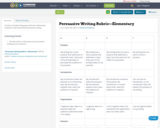
A rubric in student language written for elementary students to self-assess their persuasive writing.
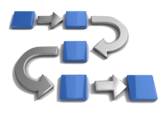
Mark A. Tambone, Passaic County Community CollegeI created this process chart to aid students through the entire writing and editing process. Additionally, this chart helps students remain mindful of proper time management and scheduling which is needed in order to utilize our tutoring services. This work is licensed under a Creative Commons Attribution-NonCommercial 4.0 International License
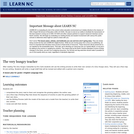
After reading "The Very Hungry Caterpillar", by Eric Carle students will use the writing process to write their own version of a Very Hungry story. They will use a flow map for pre-writing. Students will write a rough draft that will be revised and edited with a partner and a teacher.
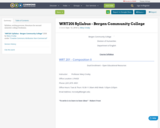
Syllabus, writing process, literature for second semester college freshmen.

ConferencesWe will meet one-on-one to discuss your Outline/Draft/Works Cited pageContinue using Worksheets from last week: *Working with Sources and *Outline
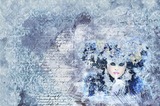
This week you will continue doing research, as needed, and also take the feedback you received during conferences and make revisions to your essay. We will also begin our Drama unit. You can read about the elements of drama and then watch a performance of Edgar Allen Poe’s short story “The Cask of Amontillado.” Research:Review the tutorial link (if you need to) for how to access the library database. Keep researching, reading, writing, using the research worksheet.Revision:When revising you want to make sure that you are developing your ideas. Push your thinking by asking yourself so what? who cares? why does this matter. So when you provide a quote from the poem, take the time to explain what you see the line to mean. Similarly, when you quote from one of your sources, also explain in your own words what the critic is saying, what you think it means. Remember to always keep your thesis in sight. How does what you are saying in each paragraph connect to your thesis?Read your paper aloud with a pen in hand. Make sure ideas are clear; that one idea flows to the next; that you are providing textual evidence for points you make (quotes). There is a self-edit worksheet to help you with revisions.

This we will continue our DRAMA unit and view a music video by Common called "Testify." You'll see a link for applying critical lenses (a skill you practiced at the beginning of the semester when we read "The Yellow Wallpaper) that we'll review.The main objectives for this week are to learn about a new genre, and review and practice the analytical skills we've been using this semester. Watch the video once. Then review the link about critical perspectives/lenses. Watch the videos again. Can you apply a lens and see something more in the video that you did not see the first time? In this week’s journal you will apply a lens. Find a fresh perspective with which to analyze the video.So that you can start thinking ahead to our final writing assignment, the guidelines for Essay 4 are posted at the end of this week's unit.

This week we will watch "Post Its: Notes on a Marriage." Consider the lenses you can apply: sociological, gender, Marxist. If this play were updated to 2017, what form of communication would the characters use? How would that be similar/different from issues of communication between the husband and wife.You will work on your presentation this week. There are links about the rhetorical situation and making a presentation. These should be helpful to you as you consider the conventions and strategies for writing in a digital format.

This week is Student Presentations.

You have made it to the top of the mountain and from here you should have a clear view of the distance you have traveled this semester. We began with the writing process and analyzing literature. Then we worked on making a claim about a work of literature and using textual evidence to support that claim. We've practiced formatting, framing & citing quotes and developing ideas. Then you progressed to analyzing and incorporating the ideas of others, through research, into the more sophisticated argument you were making about a poem. This week you will reflect on that writing.You will read a poem by Billy Collins, "Writing in the Afterlife" (he has a dry sense of humor. Consider the title as you are reading), and you'll read "3 of 16 Drafts of Elizabeth Bishop's 'One Art.'" This second reading shows you the process of a very famous villanelle, a 19 line poem that follows a specific rhyme scheme. At the end of the reading you can read Bishop's final revised poem. It is interesting to see the drafts of how this poem came into being. (See, even pro's write many drafts!)After you check out the readings, you can write your final journal and reflect on your writing this semester. Have you learned/tried/realized anything new about your writing? What worked/didn't work? What strategies will you will use for other writing assignments in other classes going forward?I hope you enjoyed the stories and poems we read this semester. Best of luck to everyone, in your studies and in life.
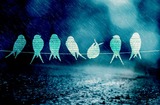
Welcome to Composition II.To begin, check out the SYLLABUS. It explains all of the goals, requirements and policies for the course, as well as provides a detailed course calendar of readings, activities and assignments. In Comp II we will read poems and stories and then you will be writing essays about the literature we read. There is a link where you can review literary terms and then take a quiz to test your knowledge. You can take the quiz as many times as you like. In literature, the meaning is not explicitly stated. (That's what essays are for :). With literature there are multiple interpretations of what a story or poem means. You can have any opinion you wish; you just need to have reasons and use evidence from the text to support/prove/illustrate your points. It is through the process of questioning and writing that you will come up with deeper ideas than you would if you merely read the story. It is my hope that you enjoy the stories and poems we will read, and also enjoy the process of analyzing and writing.This first week you will read "Bird by Bird" by Annie Lamott and consider your own writing process. Many of her ideas about prewriting, writing and revising will be helpful to you in the writing you do for this course. Then you will read and write about the short story "A&P" by John Updike.

This week you will read the short story “Greasy Lake” by T.C. Boyle. You will then write a short paper (500 words) about one of the stories you read. There will be a prompt with topic choices. Writing a short paper will help us focus on the intro, body paragraph and conclusion. Each paragraph has special conventions. You can view the Powerpoint and other links provided in this week's unit for review of the components of writing an argument essay about a work of literature.Let’s practice what Annie Lamott discusses with great humor about the writing process in "Bird by Bird." She outlines a way to get started drafting (aka writing a $hit#y first draft) in order to just get ideas down, then writing the up draft…fixing it up for clarity, support and development of ideas, and then finally the dental draft: fixing the small details like spelling, grammar and formatting.There is a link for using quotes. On your second revision you can double check that the quote you use is framed and cited correctly. You want to pick quotes where you can show your analysis. Develop the quote by explaining its significance and meaning in your own words and showing how it advances your main point (thesis).There is also a link for MLA formatting. Formatting is part of the dental draft, the fine tuning after you have drafted and revised for the big ideas, development and support.
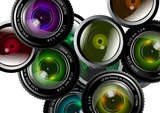
This week we will learn about additional ways in which we can analyze a text. A work can be considered for its portrayal of gender, class, culture. Check out the link: “Read about Critical Approaches in Literature.” It gives us another way to see the story. By considering how gender is portrayed, for example, we are using a specific lens (feminist) with which to view the text. Try using this lens when reading “The Yellow Wallpaper” or “The Story of an Hour.”There will be a short quiz on “The Yellow Wallpaper”. Then you will write in your journal and apply a lens.Find a relaxing place to read this week's stories. "The Story of an Hour" is very short but excellent. "The Yellow Wallpaper" is longer but this is most student's favorite story. Remember to annotate and practice close reading. Enjoy reading some great literature!

This week you write Essay 2. It will be a Compare/Contrast essay, a common assignment, but sometimes a tricky form. In order to help you better understand how comparing and contrasting two things can help you use one as a lens to better see the other, you will first view a Powerpoint about comparing and contrasting two sculptures about love. Be sure to practice writing c/c thesis statements as outlined in the PPT.Then check out the list of prompts for the various texts we've read that share a similar theme. Your mini-essay can be about marriage, or coming of age, for example. I will leave it up to you; but you will compare two texts and make a claim. Then illustrate how that claim is true by quoting from the texts. For this essay, you will freewrite until you can make a claim and come up with reasons why you believe your claim is true. Then hunt for quotes to support your claim. Now you will have an outline. With an outline you can focus on the essential elements of an essay: thesis, support, evidence. Once you have these, you have the structure of your essay and will be better able to move forward advancing an argument and not lapsing into plot summary.There is a classic essay on the writing process called "The Maker's Eye" by Donald Murray. You can read this before or after you create a draft of Essay 2, but definitely before you begin revising as Murray has many good suggestions that you can apply when revising this essay.Make sure you view the Powerpoint for how to write a compare contrast thesis. Do not write a thesis that says "there are many similarities and some differences between ____ and _____."" Look closely at slide #'s 6,7 and 8 for drafting your thesis.Use the self-edit worksheet for final revisions.